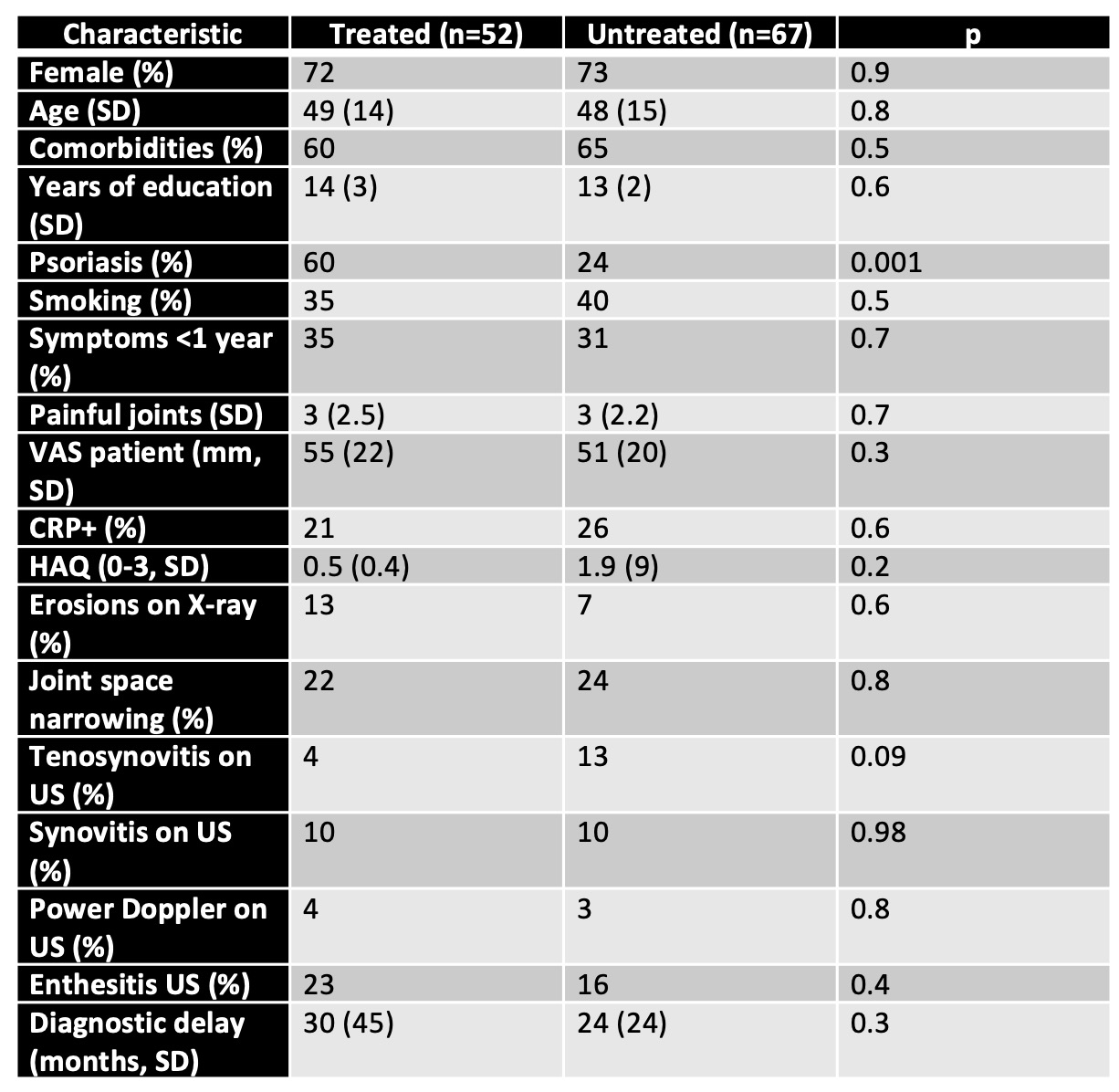Session Information
Date: Monday, October 27, 2025
Title: Abstracts: Spondyloarthritis Including Psoriatic Arthritis – Treatment I: Therapies (0873–0878)
Session Type: Abstract Session
Session Time: 11:00AM-11:15AM
Background/Purpose: The transition from psoriasis (Pso) to psoriatic arthritis (PsA) presents an opportunity for early intervention and preventive strategies in high-risk patients with arthralgia. Objectives: To estimate the frequency of treatment initiation in patients with arthralgia at risk of progression to PsA (ARP-PsA), compare characteristics between treated and untreated groups, and analyze progression to PsA after one year.
Methods: A prospective cohort study included patients >18 years with arthralgia and no prior PsA diagnosis. Baseline assessments included laboratory tests, radiography, ultrasound, and clinical evaluation (reuma-check). Data on demographics, joint count, global VAS, HAQ, Pso, and family history (FH) were collected. ARP-PsA was defined as arthralgia + Pso and/or FH. Treatment initiation with NSAIDs and/or DMARDs was evaluated, as well as progression to PsA after one year, based on our previous published research (1). High-risk factors (Pso >15 years, Pso + FH, ultrasound synovitis/enthesopathy) were assessed. Statistical tests included, descriptive analisis, chi-squared, Fisher’s exact, Student’s t-test, and Mann-Whitney.
Results: Of 1419 patients with arthralgia, 8.4% (n=119) met ARP-PsA criteria. Among them, 41% initiated treatment: NSAIDs in 22%, DMARDs in 21% (56% methotrexate), and corticosteroids in 4%. Treated patients more frequently had psoriasis (60% vs. 24%, p=0.001), while other demographic, clinical, imaging, and laboratory variables showed no significant differences (Table 1). At one-year follow-up, 29% (n=34) progressed from arthralgia to clinically classified PsA, and 62% of them had received treatment (35% NSAIDs, 26% DMARDs) (Figure 1). Among those meeting at least one high-risk criterion (36% of ARP-PsA), 65% were treated.
Conclusion: In ARP-PsA patients, 41% initiated treatment, with psoriasis being the key differentiating factor. Of those progressing to PsA, 62% were under treatment, highlighting the importance of early therapeutic intervention, particularly in patients with high-risk features.Bibliography(1) Rodrigo GS, Sebastian M, Jonatan M, Rosario J, Ronald P, Santiago R, Xenofon B. Arthralgia with risk of progression to psoriatic arthritis: role of clinical assessments and ultrasound as prognostic factors. Rheumatology (Oxford). 2024 Oct 15:keae562. doi: 10.1093/rheumatology/keae562. Epub ahead of print. PMID: 39404885.
 Table 1: Characteristics of ARP-PsA Patients Based on Treatment Initiation
Table 1: Characteristics of ARP-PsA Patients Based on Treatment Initiation
To cite this abstract in AMA style:
García Salinas R, Reyes-Jara G, Almada F, Arguello J, Magri S. Therapeutic Approach in Patients with Arthralgia at Risk of Progression to Psoriatic Arthritis. [abstract]. Arthritis Rheumatol. 2025; 77 (suppl 9). https://acrabstracts.org/abstract/therapeutic-approach-in-patients-with-arthralgia-at-risk-of-progression-to-psoriatic-arthritis/. Accessed .« Back to ACR Convergence 2025
ACR Meeting Abstracts - https://acrabstracts.org/abstract/therapeutic-approach-in-patients-with-arthralgia-at-risk-of-progression-to-psoriatic-arthritis/

.jpg)